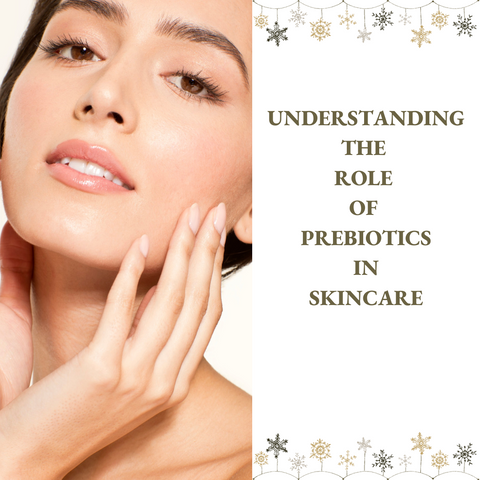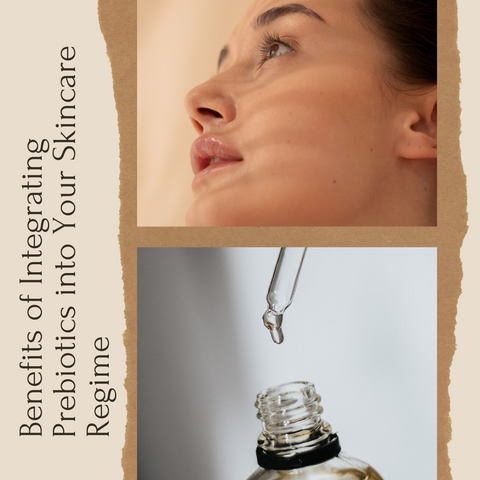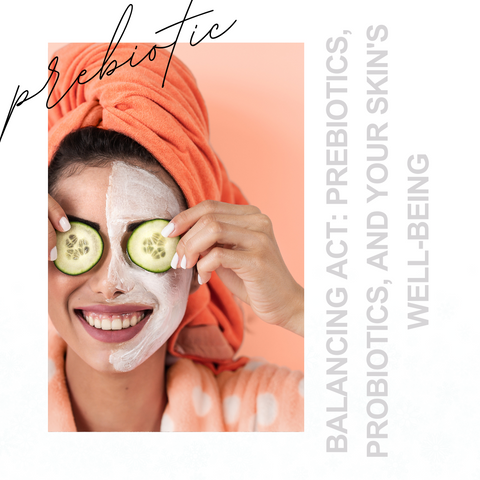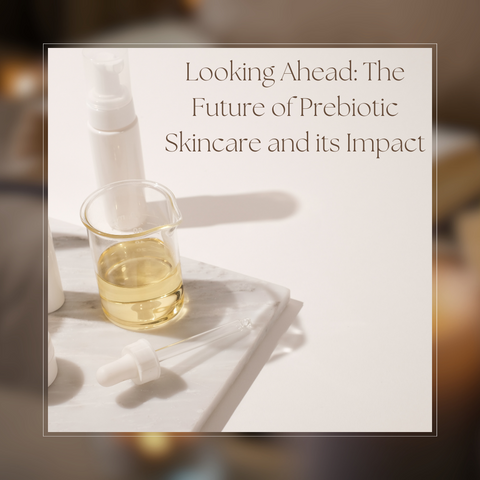Prebiotic skincare is gaining popularity due to its ability to replenish the skin's ecology and promote overall skin health. We will look at how prebiotic skincare works and its possible benefits in this blog.
Understanding the Role of Prebiotics in Skincare

Prebiotics are important in skincare because they promote a healthy environment for the beneficial bacteria that naturally live on the skin's surface. Prebiotics play an important role in skincare by nourishing beneficial microorganisms, balancing the skin microbiome, supporting skin barrier function, reducing skin sensitivity, improving skin conditions, enhancing skin radiance and texture, being used in skincare products, complementing probiotics, and supporting long-term skin health. Incorporating prebiotic-rich products into a skincare routine can aid in the promotion of a balanced microbiota and the overall health of the skin.
The Fundamentals: What Are Prebiotics?
Prebiotics are non-digestible chemicals that act as food or fuel for beneficial bacteria (probiotics) that live naturally in the gut and on the skin's surface. These substances encourage the growth and activity of beneficial microbes, hence assisting in the maintenance of a healthy microbial balance. Prebiotics, in a nutshell, feed healthy bacteria, boosting their growth and amplifying their beneficial effects. They contribute to the growth of these beneficial microbes while inhibiting the growth of dangerous or pathogenic germs. Prebiotic-rich items in the diet and prebiotic-containing skincare products can assist in supporting the body's beneficial bacteria and contribute to general health and skin wellness.
How Prebiotics Enhance the Skin's Microbial Balance
Prebiotics help to improve the skin's microbial balance by creating an environment that encourages the growth and activity of beneficial bacteria. Prebiotics help to maintain a healthy skin microbiome in the following ways:
-
Nourishing Beneficial Microorganisms: Prebiotics provide food for the beneficial bacteria that naturally live on the surface of the skin. These microorganisms are typically in the form of non-digestible fibres or carbohydrates. These substances feed the advantageous microorganisms, encouraging their development and multiplication.
-
Selective Stimulation: Prebiotics inhibit the growth of potentially hazardous microorganisms while specifically promoting the growth of certain beneficial bacteria, such as some strains of lactobacilli and staphylococci. This targeted nutrition supports the upkeep of a varied and harmonious skin microbiome.
-
Restoring Microbial Balance: The skin's natural microbial balance can be upset by a variety of factors, including environmental stressors, harsh skincare products, and pH imbalances. By encouraging the growth of beneficial bacteria, prebiotics help to restore this balance and promote a more robust and healthy skin ecosystem.
-
Strengthening the Skin Barrier: A healthy skin barrier is closely associated with a balanced skin microbiome. Prebiotics encourage the development of good bacteria, which strengthens the skin barrier. This helps to decrease sensitivity, increase resistance to environmental aggressors, and improve skin hydration.
-
Enhancing Skin Health: An optimally balanced skin microbiome has been linked to better skin health. Prebiotics help to keep this equilibrium in check, which can help to lessen skin disorders like sensitivity, inflammation, and acne.
-
Improving Overall Skin Function: Prebiotics support a number of processes that lead to overall skin health by feeding good bacteria. These processes include supporting skin cell turnover, bolstering the skin's defence mechanisms, and regulating pH levels.
-
Use in Skincare Products: Prebiotic-containing skincare formulas work to maintain the microbial balance of the skin. These goods, which include cleansers, moisturisers, and serums, might contain prebiotic-rich components that support the growth of good skin bacteria.
-
Synergy with Probiotics: Adding probiotics and prebiotics to skincare products can have a synergistic effect that increases the advantages of both. While prebiotics provide nutrition, probiotics introduce live beneficial bacteria directly onto the skin, promoting skin health.
Understanding the role of prebiotics in microbial balance in the skin emphasises their importance in maintaining a healthy and diverse skin microbiome. By supporting the growth of beneficial bacteria, prebiotics contribute to overall skin wellness and resilience.
The Synergy of Prebiotics and the Skin’s Natural Ecosystem
The interplay of prebiotics with the natural environment of the skin is crucial for maintaining a healthy and balanced skin microbiome. The synergy operates as follows:
-
Supporting Beneficial Microorganisms: Prebiotics provide food for the probiotics, or good bacteria, that are naturally present on the surface of the skin. This food supports the development and activity of these beneficial microbes, fostering an atmosphere that encourages their growth.
-
Preserving Microbial Diversity: Skin health depends on a balanced, diverse skin microbiome. Prebiotics inhibit the growth of pathogenic microorganisms while specifically promoting the growth of certain beneficial bacteria. This supports the preservation of the skin's varied microbial ecology.
-
Restoring Imbalances: The skin's natural balance can be upset by outside influences like harsh skincare products, stressful environments, or pH shifts. By creating an environment that supports the development of beneficial bacteria, which can help mitigate the effects of these disruptions, prebiotics assist in restoring this balance.
-
Improving Skin Barrier Function: A strong skin barrier is a result of a well-balanced skin microbiome. Prebiotics help with this by encouraging the development of good bacteria, which can bolster the skin's defence mechanisms naturally. Strong skin barrier defences against environmental aggressors, keeps the skin hydrated, and helps prevent moisture loss.
-
Minimising Skin Sensitivity: Skin sensitivity and irritation can be caused by an unbalanced microbiome. Prebiotics lessen skin sensitivity by promoting the development of good bacteria that help lower inflammation and maintain a stronger skin barrier.
-
Enhancing General Skin Health: Prebiotics and the skin's natural ecology work together to improve general skin health. It can help by creating an atmosphere that promotes healthier skin conditions, which can help with conditions like rosacea, eczema, and acne.
-
Adapting to Individual Skin Needs: Prebiotics are capable of adapting to various skin types and conditions. They collaborate with the skin's natural ecosystem to provide personalised care that is tailored to individual skin needs while maintaining a harmonious balance.
-
Incorporation in Skincare: Prebiotic-containing skincare products aim to enhance this natural synergy. These formulations frequently contain prebiotic-rich ingredients that nourish and support the beneficial bacteria on the skin's surface, resulting in a healthier skin environment.
Understanding the interaction between prebiotics and the skin's natural ecosystem emphasises the significance of maintaining a healthy skin microbiome. This synergy makes a significant contribution to overall skin health, resilience, and a more vibrant complexion. Incorporating prebiotic-rich products into a skincare routine can help maintain this critical balance and support the skin's natural defence mechanisms.
Benefits of Integrating Prebiotics into Your Skincare Regime

Incorporating prebiotics into your skincare routine can provide numerous benefits to the health and well-being of your skin. The following are some of the benefits of incorporating prebiotics into your skincare routine:
-
Promotes a Healthy Microbiome: Prebiotics promote the growth of beneficial bacteria on the skin's surface, promoting a diverse and balanced skin microbiome. A healthy microbiota is linked to better skin health, less inflammation, and a stronger skin barrier.
-
Strengthens the Skin Barrier: A healthy microbiota contributes to a better skin barrier. Prebiotics increase the growth of good bacteria, which improves hydration, lessens sensitivity, and increases resistance to environmental stressors, all of which contribute to maintaining this barrier.
-
Minimises Skin Sensitivity: Prebiotics can aid in lowering skin sensitivity and irritation by fostering a balanced microbial environment. This is especially beneficial for people who have sensitive or easily irritated skin.
-
Supports Skin Conditions: By promoting a healthier skin microbiome, prebiotics have demonstrated promise in managing a variety of skin conditions, including acne, eczema, rosacea, and dryness. This may result in less inflammation and an improvement in the general state of the skin.
-
Enhances Skin Texture and Radiance: Healthier-looking skin is linked to a microbiome that is in balance. Prebiotics support the skin's natural renewal processes, which may lead to improved skin texture, more even skin tone, and a youthful complexion.
-
Enhances Nutrient Absorption: Prebiotics have the ability to improve the skin's absorption and utilisation of nutrients found in skincare products, which may increase the effectiveness of other beneficial ingredients used in your skincare regimen.
-
Complements Probiotics: Prebiotics can have a synergistic effect with probiotics or products containing live beneficial bacteria, increasing the benefits and promoting general skin health.
-
Maintains Long-Term Skin Health: Using prebiotic-rich skincare products on a regular basis can help maintain a healthy skin microbiome, which is essential for long-term skin health and resilience.
When incorporating prebiotics into your beauty regimen, consider using products that are specifically made with prebiotics or prebiotic-rich components such as inulin, fructooligosaccharides (FOS), or some plant extracts known for their prebiotic qualities. If you have specific skin issues or conditions, always patch-test new products and consult with a dermatologist.
Reinforcing the Skin's Natural Defenses
By promoting a balanced and healthy skin microbiota, incorporating prebiotics into your skincare routine can help to strengthen the skin's natural defences. Here's how prebiotics help to boost the skin's natural defences:
-
Balances the Microbiome: Prebiotics feed beneficial bacteria (probiotics) on the skin's surface, promoting a diversified and well-balanced microbial habitat. This healthy microbiota is essential for the skin's natural defence mechanisms.
-
Strengthens Skin Barrier Function: A well-balanced microbiome is closely linked to a strong skin barrier. Prebiotics promote the growth of beneficial bacteria, resulting in a healthier barrier to environmental stressors, pollutants, and pathogens.
-
Supports Immune Response: The skin's microbiome contributes to the skin's immune response. A well-balanced microbiome, aided by prebiotics, may help regulate immune function and reduce unnecessary immune responses, thereby improving overall skin health.
-
Reduces Inflammation: Inflammation can be caused by a disrupted or imbalanced microbiome. Prebiotics can reduce inflammation and maintain a more harmonious environment on the skin's surface by encouraging the growth of beneficial bacteria.
-
Improves Skin Resilience: A healthy skin microbiome supported by prebiotics can improve the skin's resilience against external aggressors, allowing it to cope with stressors more effectively and reducing the likelihood of sensitivity or irritation.
-
Supports Healing Processes: Prebiotics help to create an environment that encourages the growth of beneficial microorganisms, which can contribute to faster and more effective skin healing processes when the skin is damaged or compromised.
-
Protects Against Pathogenic or Harmful Bacteria: Prebiotics work to prevent the overgrowth of pathogenic or harmful bacteria, which can otherwise cause infections or skin problems, by creating an environment that is favourable to beneficial bacteria.
-
Maintains Homeostasis: Prebiotics help to keep the diverse, well-balanced skin microbiome on the skin's surface stable and healthy, which allows the skin to function at its best.
Prebiotics help to strengthen the skin's natural defences by promoting a balanced microbiome. Prebiotic-rich products can help maintain a harmonious ecosystem on the skin's surface, boosting general skin health and resilience against numerous environmental influences.
Restoring Radiance and Vitality to the Skin
Including prebiotics in your skincare routine can help restore shine and vitality to your skin. Prebiotics help improve skin health and promote a youthful appearance by balancing the skin microbiome, improving skin barrier function, reducing inflammation and sensitivity, supporting skin renewal, improving skin texture and tone, protecting against environmental damage, enhancing overall skin health, and complementing other skincare ingredients. Prebiotics can help restore radiance and vitality to the skin by nurturing a balanced microbiota, producing a healthier and more vibrant complexion. Incorporating prebiotic-rich products into your skincare routine will help you reap these advantages and improve your overall skin health.
Combatting Common Skin Concerns with Prebiotics
Prebiotics can help with a variety of common skin problems by promoting a healthy and balanced skin microbiota. Prebiotics can help with the following skin problems:
-
Acne-Prone Skin: Prebiotics promote the growth of beneficial bacteria that can aid in acne management. They promote a healthy microbiome by inhibiting the growth of acne-causing bacteria, reducing inflammation, and balancing oil production.
-
Sensitive Skin: Skin sensitivity can be caused by imbalances in the skin microbiome. Prebiotics aid in the restoration of balance, the reduction of inflammation, and the reduction of skin reactivity, all of which can alleviate sensitivity and discomfort.
-
Dehydration and dryness: A well-balanced microbiome helps to strengthen the skin barrier, reducing moisture loss. Prebiotics help to maintain hydration and prevent dryness by supporting this barrier.
-
Inflammation and Redness: Skin inflammation can be exacerbated by an imbalanced microbiome. Prebiotics promote a healthy environment by supporting beneficial bacteria that aid in the management of inflammatory responses.
-
Uneven Skin Tone: A balanced microbiome helps to improve skin texture and tone. Prebiotics can help promote a healthier complexion by encouraging the growth of beneficial bacteria, resulting in more even skin tone.
-
Eczema and Dermatitis: Prebiotics help to restore balance to the skin's microbiome, potentially reducing the severity of eczema or dermatitis. They may help alleviate symptoms by promoting a stronger skin barrier and decreasing inflammation.
-
Premature Ageing: A healthy microbiome contributes to overall skin health, potentially slowing the ageing process. Prebiotics can help maintain a healthy skin microbiome, reducing oxidative stress and promoting a more youthful appearance.
-
Rosacea: Skin microbiome imbalances can aggravate rosacea symptoms. Prebiotics may aid in the treatment of rosacea by restoring balance, decreasing inflammation, and promoting a healthier skin barrier.
Consider using skincare products formulated with prebiotics or prebiotic-rich ingredients when treating specific skin concerns with prebiotics. These products can help restore skin microbiome balance, promoting healthier skin and potentially alleviating a variety of skin issues. However, if you have severe or persistent skin concerns, it is critical to patch-test new products and consult with a dermatologist.
Balancing Act: Prebiotics, Probiotics, and Your Skin's Well-being

By promoting a healthy and harmonious environment for helpful bacteria, balancing prebiotics and probiotics in your skincare routine can significantly improve your skin's well-being. Maintaining a healthy skin microbiome by balancing prebiotics and probiotics in your skincare routine helps promote skin health, resilience, and a beautiful complexion. However, it's critical to patch-test new products and seek personalised skincare advice from a dermatologist, especially if you have specific skin issues or disorders.
Deciphering Between Prebiotics and Probiotics in Skincare
Understanding the distinctions between prebiotics and probiotics in skincare is critical for determining how each works for skin health:
-
Prebiotics:
-
Prebiotics are non-digestible compounds (typically carbohydrates or fibres) that act as food or nourishment for beneficial bacteria (probiotics) found naturally on the skin.
-
Prebiotics have the function of supporting the development and multiplication of good bacteria, which promotes a diverse and well-balanced microbiome.
-
They promote the growth of beneficial bacteria, strengthen the skin barrier, reduce inflammation, and support overall skin health, resulting in a healthier skin ecosystem.
-
Inulin, fructooligosaccharides (FOS), xylooligosaccharides (XOS), and certain plant extracts known for their prebiotic properties are examples of prebiotic-rich ingredients in skincare products.
-
Probiotics:
-
Probiotics are live, beneficial bacteria or microorganisms that are applied topically to the skin with the goal of restoring the skin's microbial balance.
-
Probiotics are live beneficial bacteria that are directly introduced onto the skin's surface, potentially aiding in the maintenance of a healthy microbiome and supporting skin health.
-
They help to balance the skin's microbial environment, reduce harmful bacteria, and support the skin's natural defence mechanisms.
-
Probiotic skincare products may contain live bacterial cultures, fermented ingredients, or probiotic extracts that are intended to introduce beneficial bacteria onto the skin.
Both prebiotics and probiotics can help to maintain skin health and a healthy microbiome. Some skincare products mix prebiotic and probiotic components in the hopes of creating a synergistic impact for improved skin benefits. Individual skin sensitivities can differ, so it's critical to test new skincare products and, if necessary, get personalised guidance from a dermatologist.
Harnessing a Symbiotic Relationship for Optimal Skin Health
Using a symbiotic relationship between prebiotics and probiotics in skincare can improve skin health by combining their beneficial effects on the skin's microbiome. This is how the synergy works:
-
Prebiotics as Nourishment: Prebiotics feed the beneficial bacteria (probiotics) that live on the skin's surface. They supply the nutrients required for the growth and activity of these beneficial microorganisms.
-
Supporting a Balanced Microbiome: Combining prebiotics and probiotics creates an ideal environment for beneficial bacteria to thrive. Prebiotics provide the nutrition that probiotics require to grow and thrive, resulting in a more balanced and diverse skin microbiome.
-
Enhanced Skin Benefits: Prebiotics and probiotics can work together to support a variety of skin benefits. This includes strengthening the skin barrier, reducing inflammation, balancing oil production, improving skin texture, and promoting overall skin health.
-
Comprehensive Skin Support: The symbiotic relationship between prebiotics and probiotics provides a comprehensive approach to maintaining a healthy skin microbiome. It aims to create an ideal environment for beneficial bacteria to thrive, resulting in better skin conditions and resilience.
-
Possible Synergistic Effects: Some skincare formulas incorporate fermented extracts or live probiotics with ingredients high in prebiotics. This pairing might strengthen the advantages of probiotics and prebiotics, resulting in a more potent symbiotic impact on skin health.
-
Personalised Skincare Solutions: Combining symbiotic skincare products can help provide individualised care for people with particular skin issues, resulting in a complexion that is more resilient, balanced, and radiant.
While the synergy of prebiotics and probiotics in skincare shows promise, it's important to note that individual skin responses can differ. Patch-testing new skincare products and consulting with skincare professionals or dermatologists can assist in determining the best regimen for your skin type and issues.
Tips for Incorporating Prebiotic Products into Your Routine
Including prebiotic items in your skincare routine can help to maintain a healthy skin microbiome and improve skin health. Here are some pointers for successfully incorporating prebiotic products:
-
Understanding Your Skin Type and Concerns: Before choosing prebiotic products, consider your skin type and individual concerns (dryness, acne, sensitivity, etc.). This information can help you choose the best products for your skin's demands.
-
Patch Test New Products: Before incorporating prebiotic products completely, perform a patch test on a small area of your skin to ensure no adverse reactions or irritation.
-
Begin slowly: Incorporate one prebiotic product at a time into your skincare routine to see how your skin reacts. This assists in identifying any products that may be unsuitable for your skin or cause reactions.
-
Choose Prebiotic-Friendly Products: Look for skincare products that contain prebiotics or ingredients with prebiotic properties, such as inulin, fructooligosaccharides (FOS), xylooligosaccharides (XOS), or specific plant extracts.
-
Cleansers: Begin your skincare routine with a prebiotic-rich cleanser to promote a healthy skin microbiome. This can help remove impurities while preserving the skin's natural balance.
-
Serums and moisturisers: Use prebiotic-rich serums and moisturisers to nourish and hydrate the skin. These products can aid in the growth of beneficial bacteria and the strengthening of the skin barrier.
-
Consistency Is Key: To get the most out of prebiotic products, incorporate them into your everyday skincare routine. Over time, consistent use may result in visible improvements in skin health.
-
Combine with Probiotic Products: For a complete strategy to support a balanced skin microbiome, think about combining probiotic formulations with prebiotic products.
-
Use Sun Protection: Prebiotic products, like other skincare products, will not shield your skin from damaging UV rays, so do not forget to wear sunscreen during the day. Keeping your skin safe from the sun is essential.
-
Speak with a Professional: See a dermatologist or skincare specialist if you have any specific skin conditions or concerns. They can offer tailored suggestions on how to include prebiotic products in your daily regimen.
As always, individual skin responses may differ, so it is critical to pay attention to your skin's needs and modify your skincare regimen as necessary. Integrating prebiotic products gradually and consistently can help to improve skin health and a balanced skin microbiome over time.
Looking Ahead: The Future of Prebiotic Skincare and its Impact

The future of prebiotic skincare seems promising as research into the effects of prebiotics on skin health and well-being continues. Advanced formulations, customised skincare, clinical applications, integration of prebiotics in cosmetic procedures, sustainable and natural ingredients, consumer education, regulatory standards, holistic approach to skincare, combination therapies, and preventative skincare are some potential areas and impacts that could shape the future of prebiotic skincare. As research into the complexities of the skin microbiota and the importance of prebiotics continues, we can expect more breakthroughs in skincare tailored to individual needs and problems.
































